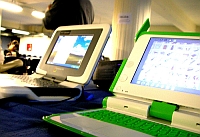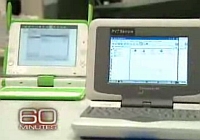I am shocked at the non-response to last week's announcement that LATU Uruguay, the government entity testing both Intel's Classmate PC and One Laptop Per Child's XO computer, rated the XO-1 the better option for the children of Uruguay's Florida province, 56.84 points to 53.06 points.
Am I the only one to notice that this was the first (and so far, only) government administered test between the Classmate PC and XO laptop? A beneficial competition between low-cost laptops for the developing world with an objective winner, One Laptop Per Child.
Where are the Linux geeks screaming victory from the top of Monte VI De Este a Oeste? Do they not realize that with Uruguay poised to buy 100,000 XO laptops running a Sugar user interface on a Linux kernel platform, it is the first large-scale loss for the Wintel duopoly?
OLPC Uruguay is a wake up call to the IT industry, even slapping futurist like Gartner with a wet glove of Open Source reality. How foolish does Annette Jump, a research director at Gartner look after predicting that:
"The success or failure of ultralow-cost PCs will depend on the following six factors: government support and funding, Microsoft support, Intel and AMD support, attractive pricing, software and training in a local language, and support costs."Hello! Uruguay to Gartner: Classmate's Intel + Microsoft overclocked blotware is no match for the FLOSS revolution. Governments, teachers, even children are tired of crapware shoved down from on high. Real innovation, real computing, real future happens when you design for your target market, every target market, not just rich ones.
Now Luis Anavitarte, research vice president at Gartner is correct to say:
"While reducing the digital divide is absolutely critical for emerging economies in their development process, it is also a powerful driver for the future of the PC industry as low-cost PC users today may become mainstream PC users tomorrow."And for Uruguay, the future is clear, the future is here, the future is One Laptop Per Child's XO laptop. Or as David Pogue says:
The truth is, the XO laptop, now in final testing, is absolutely amazing, and in my limited tests, a total kid magnet. Both the hardware and the software exhibit breakthrough after breakthrough - some of them not available on any other laptop, for $400 or $4,000.And guess what Gartner? Not an Intel processor or Windows operating system in sight. No matter how much Intel wishes it was different.




I'd be interested to know what the testing involved between the XO and the Classmate. If the tests were biased towards the XO then of course it would win. Seems little difference between 56 points and 53 points.
I hope this is a win for the students of Uruguay rather than a win for Open Source, AMD, Quanta and Nicholas Negroponte.
"If the tests were biased towards the XO then of course it would win. Seems little difference between 56 points and 53 points."
On the other hand, if the tests were biased towards the Classmate, then it is nothing short of a miracle the XO won.
Then again, if these tests were unbiased, then the XO might just be considered better for Uruguay.
The real question then is why would the Uruguay government bias their tests to the XO? What benefit would that bring them?
Did the OLPC bribe them? Did the OLPC/Quanta/AMD promise to invest in their country? Can politicians get kickbacks from reselling the laptops? Did they consider the OLPC the better "political" choice?
Btw, the last reason, the political angle, is quite common in educational policy. Because educational choices are always political choices.
Winter
It is undeniably great to see this is succeeding, but it's not exactly "the first large-scale loss for the Wintel duopoly". Like, for example the LinEx project in Spain with their 80,000 Linux boxes in schools (http://lwn.net/Articles/41738/). A very interesting project, they did not rewrite the whole UI like Sugar does, but Etoys is included, too.
"It is undeniably great to see this is succeeding, but it's not exactly "the first large-scale loss for the Wintel duopoly"."
Moreover, fighting the duopoly should take a back seat to helping children in the developing world. I think ANY political issue should take a backseat to that problem.
I will not deny that my fascination with the OLPC is largely caused by the innovative software based on Linux. But I would also not hesitate to a "better" solution if it would help the children.
I admit that I wouldn't know what would convince me that any MS Windows solution would be ebtter than Linux (or *BSD), but I keep my mind open.
(btw, I am rather agnostic about the hardware, but I do see how a win for AMD would help all of us).
Winter
This is the first government test to publish its results. UCA's (Um Computador por Aluno) efforts in Brazil are still in progress. While groups of students in two schools have had XOs for six months now, the Classmates and Mobilis machines only arrived at their respective schools in early August.
I would rather that they tested the different machines in similar classes within the same schools instead of sending them to entirely different regions. But I expect the final evaluation to be pretty subjective anyway, so perhaps this wouldn't make much of a difference.
We are interested in taking perhaps 200 to 400 laptops to students in schools in central India. We can get refurbished computers at a very low cost. If we were to contract with you to provide 400 laptops, what would be the cost per machine?
What advantages do your computers have? Do they have internet access capability? WiFi capability? Printer ports?
whoever helped make this remarkable laptop or the main person please email me at iceyflakes@hotmail.com telling me how much these laptops cost right now and also tell me where i can buy these laptops in the U.S please :)
Its good. But i guess the success or failure of ultralow-cost PCs will depend on the above mentioned six factors.